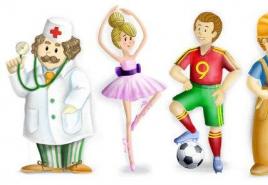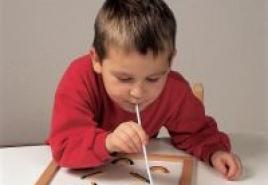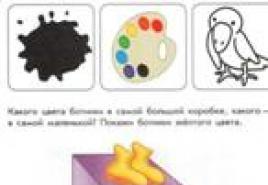Fall into despair meaning of phraseological unit. Phraseologisms
The people noticed this and began to talk about people who did something lazily, reluctantly, slowly, that they were working carelessly. Even now they say about a skillful worker that he works, rolling up my sleeves, although the sleeves may be so short that there is no need to roll them up.
Phraseologisms are stable, frozen combinations of words; their vocabulary cannot be changed.
For example: sit in a puddle- get into an awkward funny position.
Sitting in a chair or at a table is not a phraseological unit.
Look at the pictures. Literally or figuratively, the artist V.I. Tilman of heroes in a certain situation? (see Fig. 2, 3, 4)

Rice. 2. The cat cried - very little ()

Rice. 3. Walking on your head means acting up ()

Rice. 4. Nod off - doze off ()
Let's find a phraseological unit in B. Zakhoder's poem.
In appearance we are not very similar:
Petka is fat, I'm thin.
We are not alike, but still
You can't splash us with water!
Phraseologism “you can’t spill water” - they are very friendly.
The meaning of a phraseological unit is determined by selecting a synonym word or expression.
out of the blue - suddenly,
at least poke out your eyes - dark ,
there's nowhere for the apple to fall - closely,
cheat - deceive
no trace left - disappeared, hid,
mess in my head - complete confusion, confusion in thoughts
Look at the pictures. (see Fig. 5) How did the artist joke?


Rice. 5. Phraseologisms ()
Wrote like a chicken paw- about illegible handwriting.
Take the bull by the horns- boldly and immediately take on the most important thing in a difficult matter.
Let us first indicate phraseological units with the meaning “to work”, then - “idle”.
work tirelessly
from dawn to dawn
sweating it out
sparing no effort
sit in one's hands
kick your ass
Beat your head- mess around. What are baklushi?
In the old days, handicraftsmen made dishes from wood. They chopped logs of linden wood as preparations for the master spooner. It was called preparing such logs kick your ass. This work was considered trivial, which is why it became a model not of work, but of idleness. Of course, everything is learned by comparison, and this work seemed easy only in comparison with the hard peasant labor. And not everyone will be able to do their best right now (see Fig. 6).

Fig.6. Beat your head ()
The serpent Gorynych carried away the princess far.
Girl despaired
Student in class didn't listen explanation of a new topic.
The guys were talking without strangers.
There was in the refrigerator empty .
Reference: even if you roll like a ball, far away, lose heart, face to face, turn a deaf ear.
The serpent Gorynych carried away the princess far away lands.
Girl lost heart, since the problem was not solved in any way.
Student in class turned a deaf ear explanation of a new topic.
The guys were talking Tet-a-tet.
There was in the refrigerator at least roll a ball.
You can wash your ears - everyone knows that. A text called Ushariya will tell you what else you can do with your ears.
1. If your friend will help you puff up your ears(gossip), don't hang your ears(listen with confidence), better keep your ears on top(be on your guard) and don't flap your ears(inactive).
2. When you gobble up so much that there's a crackling sound behind my ears(with a big appetite), and don't believe your ears(you are very surprised) hearing this crackling sound, and it ear hurts(unpleasant) - don’t be upset! Let those who don’t have such an appetite envy you like your ears(will never happen) (see Fig. 7).

Rice. 7. Hanging ears ()
Let us recall phraseological units where animals are mentioned.
chatty like...
prickly like...
hungry like...
hardy like...
silent as...
pugnacious as...
cunning as...
slippery like...
Talkative like a magpie, prickly like a hedgehog, hungry like a wolf, hardy like a camel, silent like a fish, pugnacious like a rooster, cunning like a fox, slippery like a snake.
Let's connect the pairs with an arrow phraseological units-synonyms. They express one general concept.
two steps away
pull the wool over someone's eyes
like the wind blew away
put it in your belt
fool one's head
close at hand
wipe your nose
didn't have time to blink an eye
two steps away - just a stone's throw away(close)
splurge - fool one's head(deceive)
as the wind blew away - did not have time to blink an eye(instantly)
put it in your belt - wipe your nose(to surpass someone in something)
Let's connect phraseological units-antonyms, opposite in meaning.
like a cat and a dog
keep your mouth shut
a dime a dozen
soul to soul
sharpen the laces
like a cat and a dog - soul to soul(to be at enmity is very friendly)
keep your mouth shut - sharpen your swords(be silent - chat)
Let's insert into each sentence a phraseological unit of appropriate meaning from words for reference.
The student was sitting in class... because the day before he.... and did not prepare the task. The teacher asks him a question, and he…. ...the student sat until the end of the lesson. Out of shame he was ready...
Reference: didn’t lift a finger, fell through the ground, as if on pins and needles, as if he had taken water into his mouth, with grief in half.
He didn’t lift a finger (didn’t do anything), fell through the ground (have a strong desire to disappear), as if on pins and needles (in extreme excitement), as if he had taken water into his mouth (be silent), with grief in half (with great difficulty).
The student was sitting in class on pins and needles because the day before he didn't lift a finger and did not prepare the task. The teacher asks him a question, and he It was like taking water in my mouth. With grief in half The student sat until the end of the lesson. Out of shame he was ready fall through the ground.
Let's read the texts. Let's find phraseological units.
Yesterday we were at the circus. The audience watched the arena intently as the acrobats performed. She watched the lions' performance with concentration. When the clowns appeared, everyone laughed. After the performance, the audience sincerely clapped the artists.
Yesterday we were at the circus. Public didn't take my eyes off from the arena when the acrobats were performing. Holding breath, she watched the lions perform. When the clowns appeared, then everything burst out laughing. After the performance the audience heartily they clapped for the artists.
Isn’t it true that phraseological units decorated the text?
The meaning of phraseological units is explained in the phraseological dictionary of the Russian language. The most commonly used phraseological units are explained in explanatory dictionaries.
The label “colloquial” (colloquial) characterizes phraseological units, the use of which gives speech a touch of ease. They are used in everyday communication, in dialogues.
For example: get into galoshes- find yourself in an awkward position.
The term “colloquial” (simple): take it out and put it down- do it immediately.
The mark “bookish” (bookish) is used to characterize phraseological units used in bookish speech.
For example, Ariadne's thread- something that helps you find a way out of a difficult situation.
The expression arose from the myths about the Athenian hero Theseus, who killed the half-bull, half-man Minotaur. And Ariadne helped him.
During the lesson, you learned that phraseological units are stable combinations of words that are close in meaning to one word. They make our speech bright, figurative, expressive. Use phraseological units in your speech.
Bibliography
- M.S. Soloveychik, N. S. Kuzmenko “To the secrets of our language” Russian language: Textbook. 3rd grade: in 2 parts. - Smolensk: Association XXI century, 2010.
- M.S. Soloveychik, N. S. Kuzmenko “To the secrets of our language” Russian language: Workbook. 3rd grade: in 3 parts. - Smolensk: Association XXI century, 2010.
- T. V. Koreshkova Test tasks in the Russian language. 3rd grade: in 2 parts. - Smolensk: Association XXI century, 2011.
- T.V. Koreshkova Practice! Notebook for independent work in the Russian language for 3rd grade: in 2 parts. - Smolensk: Association XXI century, 2011.
- L.V. Mashevskaya, L.V. Danbitskaya Creative tasks in the Russian language. - St. Petersburg: KARO, 2003.
- G.T. Dyachkova Olympiad tasks in Russian. 3-4 grades. - Volgograd: Teacher, 2008.
Homework
- Read the poem.
Ours and Mine.
Ours met
All is mine! -
Mine screams.
My ball
the chair is lame
also mine
my table
my bed,
my backpack
My notebook.
Book purchased -
For me -
my family.
And on me -
my suit
my underwear.
Not in the world
But he was told
There is mine
But there is also ours:
Our house,
our yard
ours with you
talk.
Besides,
our school,
our class,
our friendship,
our honor...
can't be counted.
Ours shines
Our sun
That's what Nashe says.
And Mine repeats its own:
Everything is mine, mine, mine!
And Mine squeaks its own,
like the river Komaryo...
Unfortunately, still
This dispute is not over.
(G. Sapgir)
Why do you think Mine and Ours argue?
Choose suitable phraseological units for each participant in the conversation.
Reference: to instruct the mind to the mind, to fill your pocket, to put your paw on, one song, for yourself, with a pure heart, you can’t believe your ears, you can’t beg for snow in winter.
- Read the text about Grandma Nadezhda. Instead of periods, insert phraseological units.
People said about great-grandmother Nadezhda that she was a person... All her long life she has been from... and tried her best to help everyone. She had many troubles and hardships..., but never... and.... She tried to find ... with her neighbors, and lived with friends and relatives ... She loved children ... and accepted ... their sorrows and worries. If one of them was sick, then great-grandmother Nadezhda... She knew how to find such a kind word that the pain... and the illness would go away. Her heartfelt desire to help everyone went... and she did it...
Reference: a big heart, a pure heart, carry it on your shoulders, don’t lose heart, don’t cheat, find a common language, live soul to soul, love with all your heart, take it to heart, don’t find a place for yourself, how to take it off with your hand, tirelessly.
- Find phraseological units in the text and select synonymous words for them.
Mom asked Petya to weed the garden bed. Petya replied that he would do the job well, which gave him the chance to cut off his head. With half-hearted grief, he only pulled out the tall weeds and went to watch cartoons. He sits on the sofa and does not blow his nose. Mom realized that you couldn’t cook porridge with Petya, and she went to weed herself.
- Internet portal Idioms.chat.ru ().
- Internet portal Tvoyrebenok.ru ().
- Internet portal Usfra.ru ().
Fall into despair
Fall into despair
come to despair, howl, tear your vestments, despair, hands give up
Dictionary of Russian synonyms.
See what it means to “fall into despair” in other dictionaries:
DESPAIR, despair, many. no, cf. (book). A state of extreme hopelessness, loss of spirit due to grief, trouble. “Despair took possession of me.” Pushkin. “I hope to touch him with my tears and despair.” Pushkin. “It was a moment of insane despair... Ushakov's Explanatory Dictionary
fall into- I will fall/, you will fall; fell, la, lo; fallen; St. see also to fall into, confluence 1) To become sunken. Cheeks sunken. The chest has sunk. 2) what to plunge into what l. condition, position (usually difficult, difficult) ... Dictionary of many expressions
You will fall, you will fall; past fell, la, lo; prib. past sunken; owls (nesov. fall). 1. To fall in, to go inside. What a change! She and not her. Her features, but she is pale, her eyes seem a little sunken. I. Goncharov, Oblomov. His face is drawn, his cheeks are sunken... Small academic dictionary
Fall in, fall in, fall in. Synonyms can also develop completely synonymous, phraseologically related meanings. A striking example is the verbs vvat and vvaletsya. The verb vvaletsya has one of its meanings phraseologically related, synonymous with... ... History of words
FALL, you will fall, you will fall, past. vr. fell; fallen (fallen came out of usage). Sovereign to fall into 2 and 3 meanings. The patient's eyes were sunken. I fell into despair. “Now I won’t fall into this childish behavior.” Griboyedov. Ushakov's explanatory dictionary. D.N. Ushakov... ... Ushakov's Explanatory Dictionary
FALL, you will fall, you will fall; fell, la; sunken; having fallen; Sovereign 1. (1st person and 2nd person not used). Become sunken. Cheeks sunken. 2. what. Come to what location (unpleasant, severe) condition or come to something. (wrong) in behavior, views. V. in... ... Ozhegov's Explanatory Dictionary
I will fall, you will fall; fell, la, lo; sunken; St. 1. Become sunken. Cheeks sunken. The chest has sunk. 2. what. Immerse yourself in what l. condition, position (usually difficult, difficult). V. in despair. V. deep in thought. V. into unconsciousness, oblivion (lose consciousness,... ... encyclopedic Dictionary
DESPAIR, DESPAIR I am; Wed A state of extreme hopelessness, hopelessness. Come, fall into o. Bring, bring to o. who l. Cry out of despair... encyclopedic Dictionary
despair- despair/yanya A state of extreme hopelessness, hopelessness. Come, fall into despair. To bring, to drive someone into despair. Cry out of despair... Dictionary of many expressions
Hands give up, despair, tear your vestments, fall into despair, howl Dictionary of Russian synonyms ... Synonym dictionary
Books
- A Case for Real Men, David Gerrold. The novel “A Case for Real Men” opens the cycle “War with Chtorr” by the famous American science fiction writer David Gerrold. What to do if aliens arrived on your planet, softly...
Design and research technology.
Russian word.
(Vocabulary. Phraseology.)
Report lesson
on the topic “Vocabulary.” Phraseology"
View: lesson - project.
Equipment: tables, diagrams, wall newspaper “This is Interesting”, illustrative material, exhibitions of books and materials from the school historical museum.
During the classes.
I. Motivation.
Guys, you have been doing research for three weeks. You collected material on the topic of your choice, analyzed the word as a unit of language, prepared exhibitions, diagrams, and selected examples from works of art.
Today we have a lesson - a report on the work done. Each of you explored one area of “Vocabulary.” Phraseology", but you need to know this section of linguistics in its entirety. During the lesson you will receive useful information. Your task is to write down the main points of the guys’ report and pass the information received through yourself. You can ask questions to the researchers. After each report you will do small practical work. And your success depends on how fruitfully you work. The information you will learn today will help you successfully pass the test in the “Vocabulary” section. Phraseology" and complete the tasks of the Unified State Exam in grade 11.
For the first time, we are studying the material using the design-research technology method. I wish you good luck, interesting work and solid knowledge.
II.Exchange of research
Chapter 1. Polysemy.
A group of children did vocabulary work, and now they will tell everything they have learned about the word “Vocabulary”, about single-valued and polysemantic words, about literal and figurative meaning.
1. Performance of group No. 1:
2. Practical work No. 1.
1. (each group receives a card with words)
Construct phrases in which words are used in literal and figurative meaning.
1.Storm - snowstorm - storm of feelings
2. Iron - iron hoop - iron will.
3.Ocean - the world ocean - the ocean of love.
4. Rag – a wet rag. – He is a weak man, a rag, in a word.
5. Tail – fox tail. – A man checks to see if a tail is following him.
6.Sunset – sunset – creative sunset.
7. Head – headache. – It’s up to you to decide: you are our head.
8.Sweet – sweet cake – sweet look.
9. Deaf - deaf old man - deaf to other people's troubles.
3. Test (for each group)
4. Chapter 2. "Doubles, but not brothers"
1.The teacher's word.
A club of doubles has been created in New York. Only those who resemble some famous person can become a member of the club. The club already has 11 Eisenhowers and 7 Churchills.
As you can see, these people can be of different kinds - tribe, social status, wealth, profession, interests. The only sign by which their unification occurred was formal similarity. The Russian language also has such words - doubles.
2. Performance of group No. 2.
3. Task:
Determine the meaning of words - homonyms.
Compose a phrase to differentiate these meanings.
1.Glasses – wear glasses – score points in a competition
2. Oatmeal – delicious oatmeal – oatmeal on a branch
5.Note – musical note – note of protest
6.Wednesday – day of the week – animal habitat
7. Homes – warm houses – tall houses
8. News - latest news - broadcast
9. Rinse - rinse clothes - rinse brother
Chapter 3. A motley family.
1. Dramatization
Excerpt from “The Twelve Chairs” by Ilf and Petrov. (See “Journey into the Word” p. 165 Ogarkov Oleg and Zyablov Zhenya).
2. The teacher's word.
More than seventy ways to express one concept! Even the ancient Greeks drew attention to the property of different words to express the same thought.
Group 3 will talk about verbal relationships - the phenomenon of synonymy.
3. Performance of group No. 3.
4. Class assignment:
Pushkin has the following lines: “My sadness is bright.”
Explain the meaning of the word sadness
(state of mental bitterness, burden).
Find synonyms for this word
(Sadness - sadness - sorrow - grief - despondency - sadness - sadness - sadness - dryness) (See Dictionary of synonyms and antonyms. Victoria Plus. St. Petersburg 2002, p. 181)
Chapter 4. The great confrontation.
1. Teacher's word.
Words in the Russian language can be connected not only by synonymous relations, but also by antonymic ones. Before a word has the honor of being called an antonym, it must find its opponent - a word with the opposite meaning. This condition is reflected in its very name, derived from the Greek ANTI - “against” and ONIMA - “name”.
2. Performance of group No. 4.
3.Work in groups.
Select general language and contextual antonyms.
1. That same man is empty
Who is completely filled with himself.
2. Oh, if only I were poor!
Like a billionaire!
V. Mayakovsky
3. Life's best moments -
Hearts of hot dreams,
Fatal impressions
Evil, good and beauty.
Everything that is close and everything that is far,
Everything that is sad and funny
Everything that sleeps deeply in the soul,
At this moment it was illuminated.
5. Creative task. "Monument"
Assignment: convey the essence of homonyms, synonyms, antonyms in movement or poses.
(Homonyms - depict 2 identical masks, synonyms - hold hands, antonyms - stand with your back.)
Chapter 5. History of language development.
1 .Teacher's word. Mikhail Zoshchenko wrote: “And chickpeas - kasya now with the Russian phrase - trouble. The whole speech is peppered with words with foreign, vague meaning.” The writer talks about the absurd predilection of some people to use foreign words both for business and not, and without really understanding their meaning.
A famous scientist asks: “Why say SPONTANEOUS instead of RANDOM or UNINTENTIONAL? RELATIVE instead of RELATIVE, DISCUSSIVE instead of REASONABLE, RELAXATION instead of RELAXATION?” And really, why?
2. Group No. 5 is performing.
3. The teacher's word.
Borrowing cannot be avoided, because people from different countries actively cooperate. The problem is not borrowing, but who uses it and how. When choosing words, you need to be guided by the lexical norm: meaning, stylistic coloring, compatibility with other words. Violation of even one criterion can lead to a speech error.
4. Working with the textbook
Originally Russian: boat, yawl, tichka, self-propelled gun, barge, kayak, punt, raft, morochka.
Borrowed: junk (Malay - Chinese "ship"), boat - English. – cut the wave.; yacht - English - drive; kayak - Eskimo. - boat; canoe - English – shuttle; boat (bot) – nider. – rowing (sailing) vessel; catamaran - English – tied logs; sampan - fr. – three boards; boat - Dutch – rowing boat; gondola - Italian – single-oared boat; whaleboat - English – whaling ship; pie - fr. - long boat.
Chapter 6. Each era has its own active and passive vocabulary.
1.The teacher's word.
At the end of the 19th – beginning of the 20th centuries, before the advent of the tram, there was a city railway with horse traction. This road, as well as the carriage, was called a horse-drawn carriage. With the advent of the tram, and then other types of transport, the need for horse-drawn traction disappeared and the word horse-drawn became obsolete.
2. Performance of group No. 6.
The guys will explain to us what these words are called.
3.Working with the textbook.
Historicisms: the tsar is the sole sovereign, monarch; inheritance - lands, real estate belonging to the royal family.
Archaisms: assistant - a worker to carry out assignments; autocratic – monarchical; military - combat; bed - bed; dear - dear; lyakh - Pole.
Chapter 7. Dialectal and special words.
1.The teacher's word.
The Russian people live in the vast expanses of our Motherland: on the Don and Kuban, on the Desna and Pechora, on the Neva and Oka, on the Volga and Kama, on the Urals, Irtysh, Ob, Yenisei, Lena, Amur. All Russians speak the same national Russian language, so residents of the shores of the White Sea and Stavropol, Smolensk region and Siberia will understand each other, since most words are known to everyone, that is, they are commonly used.
But in different areas there are words that are understandable only to residents of a particular area. For example, the word AMUNITSA is “the handle of the stern oar.”
What are the names of such words, studied by the 7th group
2. Performance of group No. 7
Task No. 1.
3. Practical work.
Find dialectal, professional and slang vocabulary in the sentences.
1. I recently fought with two Messerschmitts -109, and I immediately knocked out one.
2. On the side of the road is a burial mound. (M. Sholokhov)
3. Students, as they say in the bursa, don’t give a damn (V. Gilyarovsky).
Task No. 2.
Analyze a sentence from the Ofenit language - traveling traders - from the point of view of the Russian language as a system (vocabulary, grammar).
The meat is running low, they would touch the skins with a slash and not take away the shivara. (I'm afraid that thieves might beat us on the way and take away our goods.)
Answers:
Task No. 1.
The first sentence uses the word “cut down” (meaning “shot down”) from the language of pilots. In the second sentence there is dialectism “to the side” (meaning “about”). In the third expression, “to hit the nail on the head” is from school jargon (meaning “to know nothing”).
Task No. 2.
From the point of view of the Russian language as a system, it can be noted that the vocabulary of this sentence is professional, and the grammar (construction of sentences, formation of word forms) is general literary.
4. Half a minute for a joke.
Exercise. Listen to excerpts from I. Kostyukov’s feuilleton “In different languages”, find jargon, select commonly used synonyms for them. (See Lesson plans for Vlasenkov’s class 10th grade compiler. p. 32)
Chapter 8. A picturesque way of expressing yourself ( Russian phraseology)
1.Staging.
Four-year-old Svetlana asked her mother if summer would be soon:
Soon. You won't even have time to look back.
Svetlana began to spin around somehow strangely.
I look around and look around, but still there is no summer...
2. The teacher's word.
At the heart of this funny incident, told by the writer K. Chukovsky in the book “From Two to Five,” lies a complex and interesting phenomenon of the Russian language - stable combinations of words. In these expressions, the words lose their independence, and the entire expression as a whole has meaning.
The children of the 8th group will explain to us which special branch of linguistics studies stable combinations of words
2. Performance of group No. 8.
3. Assignment to the class.
Phraseologisms can have synonyms and antonyms. Write down phraseological units (each on a separate line), select a) an antonymous pair for them
The cat cried -... the chickens don’t peck;
You can’t get the words out - ... he doesn’t close his mouth;
Beating around the bush - ... getting to the point;
Give a miss - ... hit the mark;
You can’t hurt a fly – like a cat and a dog;
Lose your temper -... control yourself;
Fall into despair - ... perk up.
b) make up synonymous pairs.
In a hurry - ... in a fire order;
Circle your finger -... draw on the chaff;
At all times -... at full speed;
Even if a wolf howls -... even if you shout a guard;
With all your might - ... at full speed;
Grated kalach -... shot sparrow;
You can't see anything -... it's pitch black - you can't even poke your eyes out.
III.Reflection.
Teacher's word.
So, we have completed work on the project “Vocabulary. Phraseology". We explored the main branches of lexicology. Did you like it? What did you find difficult? And interesting? I hope that now you can confidently answer the Unified State Exam questions regarding vocabulary and phraseology and write the test for the next lesson. And in conclusion, I want to play a little game and test your ability to listen and perceive information.
2. Blitz - survey.
Assignment: I throw a ball to each student, and you must answer me.
- What are pairs of words?
1.love - hate
2.doctor - doctor
3.forge (tool) – forge (in a forge)
4.run - stand
5.poet - poet
6. hard - easy
7.light (moon) – light (world)
8.early - late
9. courageous - strong
10.sly chanterelles – fried chanterelles
11.hot - hot
12.misfortune - trouble
13.evil - good
14.work - labor
15.edge (cliff) – edge (area)
16.adult - child
17.launch (satellite) – start studying
18.soft - hard
19.small - small
20. sick - healthy
21. thin (finger) – thin (hint)
22.iron (discipline) – iron (ore)
23.stone (house) – stone (heart)
3.Homework.
1. Prepare for testing.







